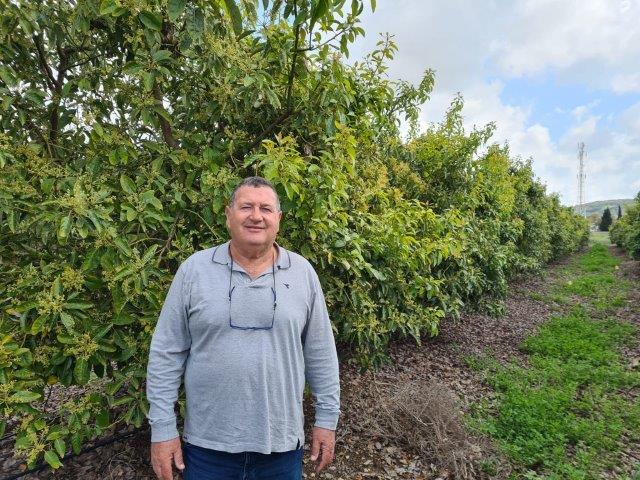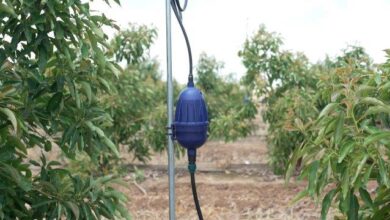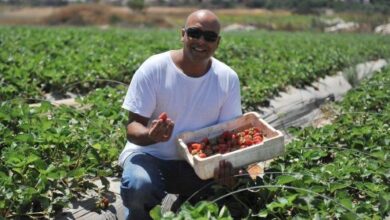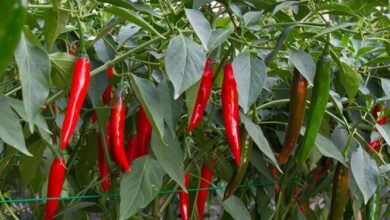The use of thermal cameras in avocado growing
A study used a thermal camera to reduce water consumption in avocado growing


a groundbreaking study was recently conducted at the ein shemer ecological greenhouse in the menashe regional council with avocado experts from granot farmers and r&d by the netafim company. the study was performed by neta baram, a 12th grader from the mevo’ot eron school, who checked the use of thermal cameras in avocado growing, in order to significantly reduce water consumption.
thermal photography technology has significantly developed in recent years. on the basis of that development, neta baram studied the possibility of increasing the credibility of thermal camera use in favor of measuring water in avocados. in the study, neta explored the correlation between the water potential in a plant, measured by a manometer, and the foliage temperature of avocado trees measured by a thermal camera. his goal was to find a high correlation between the manometer values and the thermal camera values, which would indicate a strong correlation between the water potential in the plant and its foliage temperature.
the study was conducted over a year at the ein shemer ecological greenhouse, with 24 avocado saplings divided into three different treatment groups, with each group having a different irrigation regime. the research findings indicated a medium correlation between foliage temperature measured by thermal camera and the water potential in the stem measured by manometer. the findings indicate a potential to replace measurement by manometer with measurement by thermal camera.
according to udi gafni, chief agronomist and avocado expert at granot farmers, who supervised the project, application of the study conclusions could help farmers expand the use of thermal cameras instead of manometers and enjoy the advantages of a shorter duration, reduced personnel costs, and broader coverage of trees in a single measurement, without damage to the foliage. the researchers plan to do a follow-up study over different seasons to check the seasonal impact on water potential and foliage temperature.
the agriculture industry accounts for 55% of water consumption in israel. the avocado industry in israel is thriving. it manufactures 90,000-100,000 tons of avocado a year, but the avocado tree consumes a lot of water, between 1000-1300 millimeters a season. many farms in israel have a problem of over- or under-irrigation and it is important to find a solution. a common way to know whether a plant is receiving the right amount of water is by manometer. this instrument is credible but has several shortcomings: its operation is expensive, its coverage area is small, and its use damages the tree appearance. an alternative and emerging method is the thermal camera, which can cover a large area quickly and does not require damaging the tree appearance, but there is a problem with its data credibility: previous studies found a weak correlation between the values measured by thermal camera and those measured by manometer.
giora marom, ceo of granot farmers: “it very important to granot farmers to invest in agricultural education, in the future generation and in community engagement. we see it as a privilege to be part of the ein shemer ecological greenhouse and to provide its team with our best experts, who supervise outstanding students in exceptional projects, and we are proud of this.”
ilana nulman, director of the rural and boarding school sector of the ministry of education in israel : “agriculture is a human need and therefore will always be a main premise for human life. the rural sector of the ministry of education holds a candle to that premise with pride. we represent all that is agricultural in education in this country. tens of thousands of students from the negev , the galil and all around israel learn about the state of the art techniques and we are raising the next generation of scientists, researchers and leaders in agriculture for the future of humanity”
dr. gilmor keshet-maor, director of science division in the ministry of education in israel: “students such as neta baram, receive in ein shemer ecological greenhouse an opportunity to tacle real world problems, work with experts in the agricultural industry to solve these complex problems and practice cutting edge research in agricultural sciences while contributing to development of novel precision technologies.”
added noam geva, director of the ein shemer ecological greenhouse: “the greenhouse students study agricultural challenges with community experts. our cooperation with granot farmers is very important to us. the encounter between the students and the avocado experts allows us to expose them to advanced agriculture and encourage them to seek ideas and solutions to help feed the 10 billion people in the world and protect our one and only planet earth.”




